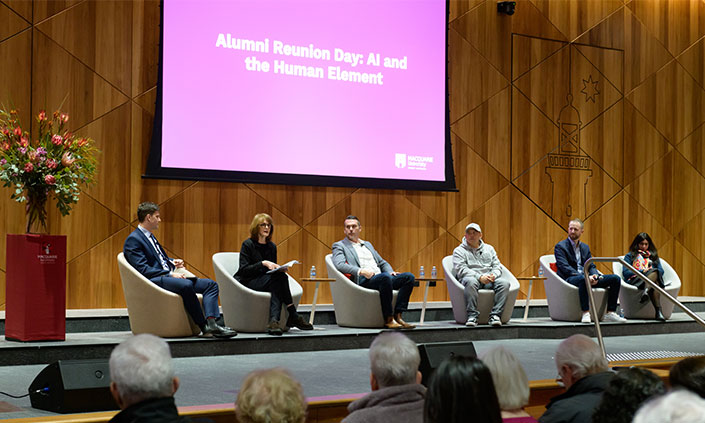AI and the human element
During Alumni Reunion Day, Macquarie experts share how AI is changing higher education – and why creativity still counts.

Universities are on the cusp of a major transformation, with artificial intelligence providing new and diverse pathways for learning and teaching, shifting away from one-size-fits-all system. They also have a leading role to play in making sure the adoption of AI is ethical, responsible and keeping humanity at its core.
That was one of the key takeaways from a high-powered panel of experts, academic and industry leaders exploring the risks and opportunities of artificial intelligence, and how it is reshaping higher education and society.
Held during the 2025 Alumni Reunion Day, the panel brought together former Chief Scientist of Australia Dr Cathy Foley AO PSM, Macquarie Law School’s Dr Niloufer Selvadurai, Macquarie’s Head of AI Phil Laufenberg, alum and venture capitalist Curt Shi, Founding Partner of Imprint Capital Partners; and Vice-President of Product and Enterprise at Freelancer Andrew Bateman.
The discussion was moderated by Macquarie’s Chief Information and Digital Officer, Jonathan Covell. The conversation revealed both optimism and caution around the rapidly evolving technology and showcased how Macquarie is already testing AI in teaching and learning.
Powering peer-to-peer learning
Phil Laufenberg, Macquarie’s Head of AI, highlighted the University’s pilot project created in collaboration with academics known as Virtual Peer, an AI-powered chatbot assistant.
To date, the chatbot has supported 15,000 students across 24 units with round-the-clock administrative queries and deciphering course content.
The results are striking: a 70 per cent reduction in routine academic emails, up to 10 per cent improvement in student performance and overwhelmingly positive student and academic feedback.
“This is about supporting students as and when they need it, and freeing academics from the tyranny of the mundane, so they can focus on what matters most – mentoring, teaching, and research,” Mr Laufenberg said.
A snake eating its own tail
The panel warned against over-reliance, particularly when AI systems train on their own errors – described by Mr Covell as the 'snake eating its tail' problem.
Mr Covell also cautioned around AI systems that evolve and train from their own flawed data – a 'snake eating its tail' problem.
“We must remember that AI is confidently wrong,” he said. “It’s capable of producing elegant but misleading answers without human oversight.”
Teaching AI literacy, they agreed, is essential for students to critically evaluate outputs rather than treat them as unquestionable truths.
Human creativity still matters
The discussion also highlighted how AI can streamline professional life. Mr Shi mentioned AI is definitely a frontier for his latest investment journey and shared how daily use of tools like ChatGPT, Gemini and Perplexity has made venture capital work 'easier and more fun,' automating tasks such as meeting minutes, due diligence and other workflows.
“AI agents will take more active roles in business processes in future, which I believe will lead to better results beyond just gut feelings on startup investment evaluations,” he said.
Mr Bateman noted freelancers are also benefiting, but human judgment remains vital: “There will always be a premium for the human touch in work outputs.”
As Mr Laufenberg put it: “This is not Industrial Revolution 2.0. It’s about rebalancing effort towards higher-value work within the same hours.”
Balancing promise and prudence
Panelists emphasised that AI adoption must be grounded in evidence, not hype.
Dr Selvadurai cautioned against AI hype, citing a 2025 study by Goldman Sachs which estimated that only 14 per cent of companies in the US were actually impacted by AI-enabled automation. She noted that unlike previous tech innovations, such as e-commerce, cloud computing and online advertising, the return on AI investment is difficult to quantify.
Dr Foley predicted that AI would play a key role in growing access to education, at all levels. “It's got the potential of democratising people's ability to get access to education and knowledge. It means that it's a tutor for every student,” she said.
Mr Shi agreed, predicting it would be the key to breaking down language barriers for international or non-speaking students. Mr Laufenberg also highlighted the importance of user experimentation, if done responsibly and ethically, to determine how best AI can support them in work and learning.
“Get hands-on with AI. Only you can find the jagged frontier – what is possible and what’s not – in your own work. Then ask yourself – what would I do with 30 per cent more time if AI took care of the rest?”